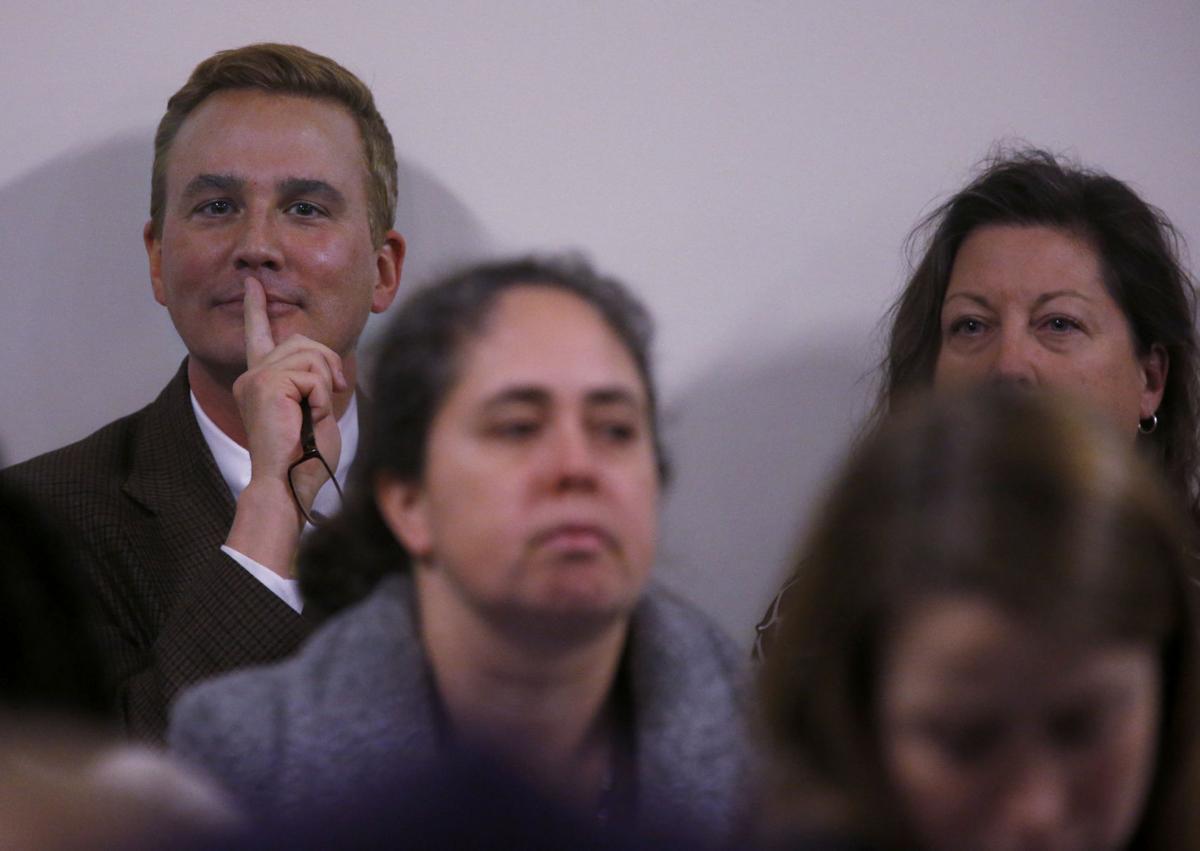
Dominion Energy spokesman David Botkins (left) listened to deliberations in the Senate Commerce and Labor Committee in the Pocahontas Building on Monday.
Don’t call it Dominion’s bill.
Sen. Dick Saslaw of Fairfax, the senior Democrat on the Commerce and Labor Committee, took issue Monday with the idea that his yet-to-be introduced legislation on overhauling a regulatory regime that has allowed Dominion Energy and Appalachian Power to pocket hundreds of millions of dollars in excess profits since 2015 was not entirely his own.
The powerful panel stacked with utility-friendly lawmakers voted 13-1 to kill a bill by Sen. Chap Petersen, D-Fairfax City, who was pushing to restore the power of state regulators to review base electric rates and refund money to ratepayers.
The vote was in deference to coming legislation by Saslaw and Sen. Frank Wagner, R-Virginia Beach, that has the backing of the influential utility.
“Let me be as clear as I can,” Saslaw said in response to a plea from a representative for large industrial electric customers that Petersen’s legislation survive long enough for a side-by-side comparison. “There is no Dominion bill. That bill is being sponsored by Senator Wagner and myself, and what goes into that bill, we’re putting in that bill. Are we talking to them? Yes, we’re talking to them. But that is not Dominion’s bill; that’s our bill.”
Yet in remarks that hit many of the same points Dominion has made since it announced last month that it was time to “transition away” from the 2015 rate freeze, Wagner, the committee chairman, cited the need to harden the electric grid against outages and cyberattacks and incorporate more renewable energy.
“We understand that there’s money to be returned and we have legislation that will do that,” Wagner said. “We’ll be ready to talk in detail at a later date.”
In September, the State Corporation Commission reported that Dominion could have “overearned” by as much as $426 million in 2016.
Last month, it told a General Assembly commission that a typical Dominion customer has seen bills go up nearly 30 percent over the past decade, largely the result of rate-adjustment clauses, or riders, which are extra charges tacked onto bills to pay for new power plants, transmission projects and other costs.
Samuel Towell, the deputy attorney general in charge of the Civil Ligation Division, which includes the office’s consumer counsel, told the committee Monday that Dominion and Appalachian have taken in revenue “far in excess of their costs and fair rate of return.”
“We are seeking to ensure that the arbiter of utility rates and costs, the State Corporation Commission, is allowed to operate on a level playing field, so that all voices before it get a fair shake,” Towell said. “If the rates are too high, as we believe they currently are, the State Corporation Commission should have the discretion to lower them to an appropriate level and to refund excess earnings.”
Petersen, who unsuccessfully pushed similar legislation last year, said he anticipated Monday’s outcome and has another measure ready to file before the Friday deadline for submitting bills this session.
“We keep hearing about this miracle bill that’s going to be all things to all people,” Petersen said. “I have a hard time believing that you’re going to get that committee to agree on refunds, plus green energy, plus additional profits to Dominion, plus curing cancer, and wrap it all in one bill.”
A companion measure to Petersen’s original bill, House Bill 96 by Del. Sam Rasoul, D-Roanoke, is still alive for the moment in that chamber. Petersen said he expects the legislation will get a different reception if it can get to the floor in either chamber.
“People are tired of Dominion dictating the laws of this commonwealth. They’re tired of large corporations writing their own regulations,” he said. “They can say whatever the purpose is, but we all know the idea is to allow Dominion to keep as much of its excess profit as possible.”
Dominion, he added, has a “vise grip” on the Commerce and Labor Committee. Many members, including Wagner, Saslaw and Sen. Tommy Norment Jr., R-James City, are major recipients of Dominion campaign contributions.
“It’s not just about money; it’s about control of information. It’s about the number of lobbyists. It’s about influence and prestige,” Petersen said. “The people on that committee are people I respect. … It’s just collectively, that committee will, by and large, do the bidding of Dominion. That’s just historically how it’s been and I’ve only been here 17 years.”
Dominion spokesman David Botkins said he would not “dignify that comment with a response.”
Citing the then-looming Clean Power Plan, President Barack Obama’s attempt to cut carbon emissions from power plants, Wagner pushed through a bill in 2015 that halted the ability of the State Corporation Commission to review Dominion and Appalachian’s base rates for the purpose of issuing refunds, supposedly to shield ratepayers from the costs of regulation.
Opponents, however, always argued that was a red herring. Now, President Donald Trump’s administration has moved to unwind the Clean Power Plan and Virginia has published its own draft carbon regulations. “Recognizing that we have a degree of certainty which we didn’t have two or three years ago, this is the appropriate time to go back into a re-regulated environment,” Wagner said.
Sen. Amanda Chase, R-Chesterfield, was one of two GOP co-sponsors for Petersen’s bill. “Republicans want the opportunity to save face,” said Chase, elected in 2015. “They want to redeem themselves. They want to say, ‘Look, we realize that under the federal environment in 2015, we did what we thought was the right thing at the time.’”
